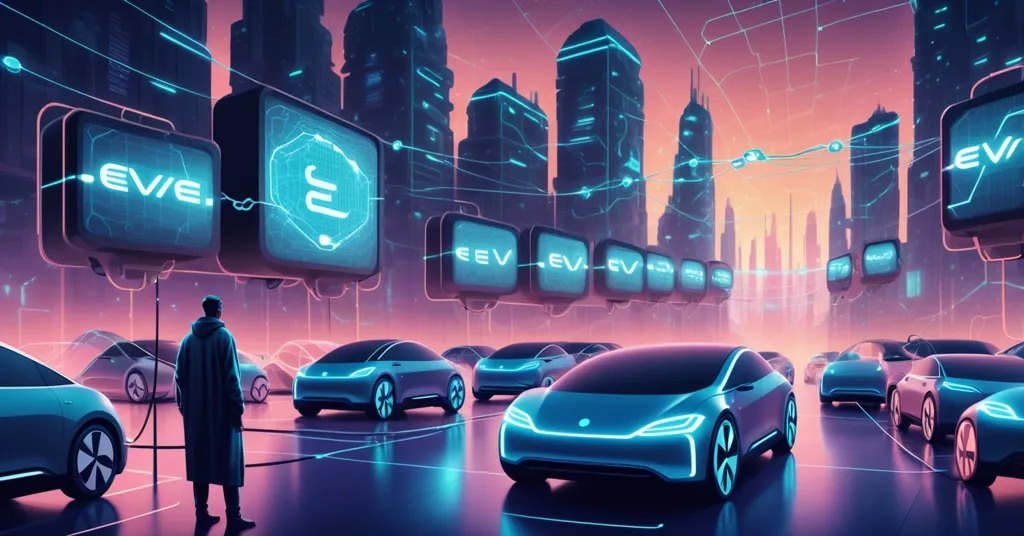China’s EV Resale Ban Targets Fraud: Can Blockchain Deliver Transparency?

China’s EV Resale Ban: Unmasking Fraud and Blockchain’s Path to Transparency
China’s electric vehicle (EV) market, a titan of innovation and sheer scale, is grappling with a scam so blatant it could give crypto’s worst rug pulls a run for their money. The Ministry of Industry and Information Technology is now weighing a six-month ban on reselling newly registered vehicles to tackle the “zero-mileage used car” fraud, where automakers and dealers fake sales to dodge the harsh realities of overcapacity and ruthless price wars. This isn’t just a car problem—it’s a trust problem, and it’s screaming for a decentralized solution.
- Fraud Crackdown: Six-month resale ban proposed to halt fake EV sales in China.
- Market Manipulation: Zero-mileage scam mirrors crypto wash trading with inflated numbers.
- Blockchain Fix: Decentralized tech could cut through opacity in EV sales and beyond.
The Zero-Mileage Scam Exposed
Imagine building cars nobody buys, then pretending you sold them to look like a market champ—that’s the zero-mileage scam in a nutshell. In China’s cutthroat EV sector, automakers and dealers register and insure vehicles without actual buyers, creating a mirage of demand to hit quotas or dazzle investors. This isn’t a petty trick; it’s systemic deceit fueled by overcapacity—making way more cars than people want to buy—and price wars that carve margins thinner than a razor’s edge. The fallout? Distorted market data, screwed-over consumers, and a trust deficit that could stall EV adoption faster than a dead battery.
The issue has sparked outrage from heavy hitters. Great Wall Motor CEO Wei Jianjun blasted the scam publicly in May, shining a harsh light on the rot. Even the Communist Party’s mouthpiece, People’s Daily, dropped a scorching editorial last month, slamming these tactics as a betrayal of industry and buyer alike. With China’s cabinet pledging tougher oversight and now this potential resale embargo reported by Auto Review, the government is signaling it’s done playing nice. But let’s not pretend a policy alone will fix a market drowning in desperation.
Brands Caught in the Crosshairs
Some players have been nabbed with their hands in the cookie jar. Neta, under Zhejiang Hozon New Energy Automobile, pre-insured a jaw-dropping 64,719 vehicles between January 2023 and March 2024—over half its reported 117,000 sales in that span. The payoff? A hollow win, as its parent company tumbled into bankruptcy last month, with Q1 2025 sales nosediving to a measly 1,215 units. Talk about a crash and burn.
Then there’s Zeekr, Geely Auto’s premium EV brand, accused of juicing 2024 year-end numbers via a state-owned dealership partner, Xiamen C&D. In Xiamen, 2,737 cars were “sold,” yet only 271 got license plates—a neon sign that most never reached real buyers. Zeekr’s response? A flat denial of state media claims, though Geely sidestepped deeper scrutiny when pressed. Denial’s a bold move when the numbers scream “busted” louder than a Bitcoin whale dumping on a failing altcoin. Neta and Xiamen C&D didn’t even bother to comment, leaving consumers holding the bag.
Consumers and Industry Pay the Price
Buyers are getting the short end of this shady stick. Many snap up what they think is a brand-new EV, often lured by sweet deals like Zeekr’s 3,000 yuan discount, only to discover a pre-existing insurance policy—insuring a car before it’s sold to fake a purchase—that expires way too soon. Picture shelling out for your dream ride, then learning it was “owned” on paper a year ago. That’s the gut punch real customers face, with some dealerships even stonewalling refunds despite the deception affecting EV buyers.
The broader industry isn’t faring much better. This trust crisis could slow China’s EV adoption domestically and taint its global rep, especially with eyes already on its dominance amid U.S. tariffs on EV battery components. Some zero-mileage cars are even exported as “used,” a slick dodge that might spark international pushback. Analyst Li Yanwei from the China Automobile Dealers Association didn’t hold back, calling pre-insurance a “whitewashing of performance” to gloss over financials, bluntly stating it’s “not advisable.”
Global Fallout and Industry Pushback
China’s EV market woes ripple far beyond its borders. With overcapacity rooted in government subsidies and production targets—pushing output over sustainable demand—fraud like this only fuels skepticism about the country’s economic playbook. The China Automobile Dealers Association has pitched a code system to track used car exports and curb policy abuse, while giants like BYD and Chery mull penalties for rogue dealers. Xpeng’s chief dropped a grim forecast, predicting just seven major carmakers will survive the next decade from over 40 today—a bloodbath reminiscent of crypto’s altcoin graveyard after the 2017 ICO frenzy. These are steps forward, sure, but they’re Band-Aids on a gaping wound. Still, mounting pressure for fraud crackdowns from industry voices shows change is brewing.
Crypto’s Mirror: Wash Trading and Fraud
So, how does this mess hook into the crypto space? Easy—fraud thrives in opacity, whether it’s cars or coins. The zero-mileage scam is a dead ringer for wash trading on crypto exchanges, where fake buy/sell activity inflates a token’s volume to sucker in investors before the inevitable dump. Both EV and crypto markets, in their wild early days, suffer from over-hype and under-regulation, with shady actors exploiting gaps for quick gains. China’s potential crackdown echoes calls for tighter crypto oversight, but here’s the rub: why wait for top-down rules when decentralized tech can outmaneuver scammers from the jump?
Blockchain as the Ultimate Fix
Enter blockchain—a tool to slice through corporate and bureaucratic nonsense with transparency as its blade. Picture a public, immutable ledger, like a Google Sheet everyone can see but no one can fake, tracking every car’s sale, ownership, and insurance status in real time. No more ghost registrations, no hidden pre-insurance schemes. A blockchain-based solution for EV transparency could kill EV market fraud dead, just as Bitcoin’s ledger secures money without greasy middlemen. It’s effective accelerationism in action—pushing tech to solve real scams faster than regulators can draft another lukewarm policy.
Bitcoin’s unshakeable ledger sets the gold standard for trustless systems, but let’s not sleep on altcoin protocols like Ethereum, which could bring smart contracts to automate vehicle ownership transfers. Different tools, same revolution. Real-world precedents exist too—think IBM’s blockchain for supply chain tracking or Estonia’s e-governance model. These show it’s not just a pipe dream; it’s doable. China’s EV market, choking on distrust, could be the perfect proving ground for such a system.
But let’s play devil’s advocate for a second. Scaling blockchain for millions of car transactions, safeguarding user privacy, and dragging centralized automakers into a decentralized future? That’s a steep climb, even for us e/acc believers. And will a six-month resale ban actually stop fraud, or just nudge scammers toward sneakier loopholes? History—from crypto pump-and-dumps to car cons—leans toward the latter. Still, the potential of a transparent, auditable fix is too damn big to ignore. If we’re serious about disrupting broken systems, let’s not just point fingers—let’s build the tools to make fraud obsolete.
Lessons for Crypto and Beyond
China’s EV fiasco offers a stark warning for the crypto space: hyper-competitive, opaque markets are fraud’s playground. Trust, once shattered, is a nightmare to rebuild, whether you’re peddling cars or tokens. The Darwinian cull Xpeng’s chief predicts—only seven carmakers standing in a decade—mirrors crypto bear markets where only robust projects like Bitcoin endure, while weak altcoins (or EV startups) crumble under scrutiny. We Bitcoin maximalists know centralized systems breed manipulation, be it automakers or banks. Yet, just as altcoins carve out niches Bitcoin doesn’t touch, China’s EV players, even the dodgy ones, drive innovation through raw competition.
The path forward is clear. If China’s EV giants can’t outrun fraud with policies alone, it’s time to accelerate blockchain adoption—not just for cars, but for every rigged system begging for a decentralized overhaul. We’ve got the tech, the vision, and the grit. Let’s stop marveling at the mess and start building the future where scams don’t stand a chance.
Key Takeaways and Questions
- What is China’s zero-mileage EV scam and how does it work?
It’s a fraud where automakers register and insure unsold electric vehicles as if bought, inflating sales to fake demand. Driven by overproduction and quotas, it’s a deceitful play akin to crypto wash trading. - Why is China considering a six-month EV resale ban?
To stop fraudulent sales data that misleads investors and erodes consumer trust, aiming for accountability in the EV sector, much like regulatory pushes in cryptocurrency markets. - How does EV market fraud impact buyers and the industry?
Buyers face pre-insured cars with early policy expirations, while the industry grapples with a trust crisis that could slow EV adoption and damage global credibility, similar to crypto scam fallout. - Can blockchain technology prevent EV sales fraud?
Yes, a decentralized vehicle registry on a blockchain could log sales and insurance transparently, making fraud near impossible—just as Bitcoin cuts out financial middlemen. - What challenges might blockchain face in solving EV fraud?
Scaling for millions of transactions, protecting user data, and convincing centralized industries to adopt decentralized tech are major hurdles, even for a solution this promising. - What can crypto learn from China’s EV market manipulation?
Opaque, cutthroat markets breed fraud—whether cars or coins. Building trust via auditable, decentralized systems like blockchain is the only way to stay ahead of scammers and regulators.



